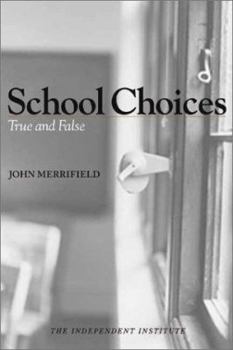School Choices: True and False
The school choice movement has gained political momentum in recent years, having established programs in Milwaukee, Florida, Texas, and elsewhere. Yet, as economist John Merrifield argues in this detailed analysis, today's school choice programs are nothing like the "free market in education" envisioned four decades ago by early proponents of school choice. Rather, they are mired in false alternatives, petty distinctions, and diminished vision, and in their present form are doomed to fail as have so many other government programs. In this text, Merrifield argues for the reformation of the school choice alternative and the eventual establishment of a freely competitive market for education, charting a course for the achievement of this goal.
Format:Paperback
Language:English
ISBN:0945999860
ISBN13:9780945999867
Release Date:September 2002
Publisher:Independent Institute
Length:100 Pages
Weight:0.70 lbs.
Dimensions:0.3" x 6.6" x 8.5"
Customer Reviews
1 rating
Strong arguements for true choice in education
Published by Thriftbooks.com User , 21 years ago
After wading through a few 300 to 600 page books recently, it was nice to come across a nice focused book. This is less than a hundred pages, but page for page it is a very informative book. The author's start the book with something that everyone knows, the current education system is broken, so very broken. He mentions that in 1983 an education commission commented that "We have done something to ourselves that would be seen as an act of war if a foreign power were to blame." His basic premise is market forces are very effective in stimulating reform. Either you meet the needs of consumers, or you go out of business. Not all consumers have to be expert consumers, we all benefit from knowledgeable consumers. Our country is largely successful because we use market forces to constantly improve most parts of our society. The author goes on to say that while back in 1955 Milton Friedman proposed something like a voucher, but over the last 50 years we've never had a real competitive education market. The few places that vouchers have been tried have been very laden with restrictions and limitations. John Merrifield convincingly argues that we need a true education market, or the children of the United States will continue to get a sub-optimal education.There were a couple interesting points in this book: Currently teachers are mostly motivated to please administrators, parents have very little influence. In response to people who claim a true education market is too risky, the author responds that changing a badly broken education system doesn't risk much. (How could it get worse?) If you are interested in education and/or school choice, this is a good book to start with.





